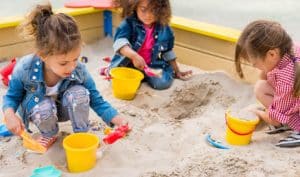
“It’s our polite nudge in the ribs to help you and your team stay organised and on task.”
This week’s subject is: Collaborative learning.
Element 5.2.1: Children are supported to collaborate, learn from and help each other.
Do educators regularly reflect on the range of ways in which educators thoughtfully and intentionally design learning spaces, routines, and experiences to encourage children to collaborate with their peers and educators, supporting their learning and development?
Services provide a range of opportunities for children to learn how to work with others collaboratively, respectfully and effectively, including through play experiences. Educators can support children to learn about and experience cooperation by modelling cooperative behaviour themselves and acknowledging cooperation when it occurs. Guide to the NQF
Educators play a vital role in fostering collaborative learning by creating environments where children feel encouraged to communicate, cooperate, and problem-solve together. Through intentional planning of experiences, group discussions, and play-based learning, educators help children develop essential social and emotional skills. They model positive interactions, guide children in working through challenges, and encourage teamwork by providing opportunities for shared decision-making.
When educators facilitate group projects, encourage peer mentoring (e.g., a “buddy program”), and integrate reflective discussions, they support children in developing confidence, respect for others, and a sense of belonging.
Ensure you document examples of collaborative learning and communicate these with families to foster a consistent and supportive approach to collaborative learning across the service.
When reflecting with your team, consider the following collaborative learning practices:
-
- How do we engage children in age appropriate, purposeful and relevant shared decision making?
- How do educators assist children to explore diverse perspectives on issues of inclusion and exclusion and fair and unfair behaviour?
- Do educators use information about children’s shared interests to plan collaborative learning experiences?
- Do educators consistently and intentionally ask children follow-up questions in group scenarios to extend children’s learning?
- How do educators plan and create opportunities for children to collaborate with others to scaffold their learning?
- What opportunities do we provide for children to take on leadership roles and direct play and learning experiences with their peers?
- How do we acknowledge, show support and encouragement when effective collaborative learning is occurring?
- Do educators respond sensitively to older children’s complex relationships with their peers and intervene in ways that promote social inclusion?
- How do we support children from diverse backgrounds and abilities during collaborative play experiences and projects?
- What range of opportunities do we provide for children to make decisions about their own learning?
- How do we plan the program and routines to ensure adequate time for children to engage in uninterrupted play experiences and projects of their own choosing, with a variety of peers and adults?
Resources:
QA5- Relationships with Children
Age-appropriate pedagogies-Collaborative
MTOP- Collaboration with children and young people
Collaborating with Children for Effective Programming: Self-Guided Learning Package
Within System7 go to Quality Area 5/Module 5 to submit self-assessment notes and if required, open a QIP issue if you identify any areas of improvement.
The Childcare Centre Desktop has a range of resources to assist services with QA5, Relationships with children. These include Interactions with Children, families and Staff Policy, Educational Program Policy, Program Template, Observation Record, Critical Reflection Template, Behaviour Guidance Guide Promoting and Supporting Positive Behaviour, Meeting Minutes Template and much more.
Resources, NQS Element, Regulation and System7 links:
Childcare Centre Desktop – Childcare Centre Desktop
National Quality Standard – QA 5/ 5.2.1- Collaborative Learning
National Regulations – 73, 74, 155, 156, 168
System7 Module – QA 5/ Module 5
If you have any questions, send us a note via the Contact page here!




